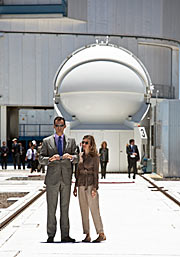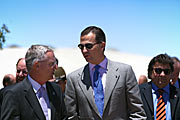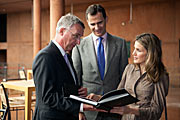Press Release
Spanish Crown Prince visits ESO's Paranal Observatory
24 November 2011
On 24 November 2011 ESO’s Paranal Observatory in Chile was honoured by a visit from Their Royal Highnesses the Prince and Princess of Asturias.
The delegation, which also included the Spanish Minister of Science and Innovation, Dr. Cristina Garmendia, the Chilean Minister of Foreign Affairs, Alfredo Moreno, and the Chilean Minister of National Assets, Catalina Parot, first had the opportunity to hear a series of presentations about ESO at the Paranal Residencia. This session was also attended by members of the international press.
The ESO Director General, Prof. Tim de Zeeuw, highlighted the challenges of building and operating state-of-the-art astronomical research facilities in one of the driest places on Earth.
“It is a great pleasure to welcome Their Royal Highnesses to the Paranal Observatory”, said Prof. de Zeeuw, “Spain is a highly valued ESO Member State. Spanish industry has made major contributions to the design and construction of ESO facilities, and Spanish astronomers are making impressive use of these world-leading scientific tools.”
The Spanish delegate and vice president of the ESO Council, Prof. Xavier Barcons, further emphasised the strong involvement of the Spanish community in ESO activities. Spain has taken a significant role in the design studies for the forthcoming E-ELT and has also been awarded large contracts to build parts of ALMA, the Atacama Large Millimeter/submillimeter Array.
The Spanish astronomer and ESO Deputy Director of Operations, Dr. Fernando Comerón, described some of the most important discoveries made with the ESO Very Large Telescope (VLT), including the first direct image of an exoplanet ever made and the confirmation of the existence of a supermassive black hole in the centre of the Milky Way.
The Prince and Princess were then shown around the VLT itself, the world’s most advanced optical instrument. They also got a rare chance to visit the interferometric tunnels underneath the telescopes. In these tunnels, the light beams gathered by the VLT Unit Telescopes are combined, allowing astronomers to see details up to 17 times finer than is possible with the individual telescopes.
The distinguished visitors were also shown the VLT control room, where ESO Spanish astronomers explained the operation of the telescopes.
The visit of the Prince and Princess of Asturias was also hosted by the ESO Representative in Chile, Prof. Massimo Tarenghi and the director of the observatory Dr Andreas Kaufer.
Spain joined ESO in 2006 and there are currently 32 Spanish nationals employed by the organisation.
More information
ESO, the European Southern Observatory, is the foremost intergovernmental astronomy organisation in Europe and the world’s most productive astronomical observatory. It is supported by 15 countries: Austria, Belgium, Brazil, Czechia, Denmark, France, Finland, Germany, Italy, the Netherlands, Portugal, Spain, Sweden, Switzerland and the United Kingdom. ESO carries out an ambitious programme focused on the design, construction and operation of powerful ground-based observing facilities enabling astronomers to make important scientific discoveries. ESO also plays a leading role in promoting and organising cooperation in astronomical research. ESO operates three unique world-class observing sites in Chile: La Silla, Paranal and Chajnantor. At Paranal, ESO operates the Very Large Telescope, the world’s most advanced visible-light astronomical observatory and two survey telescopes. VISTA works in the infrared and is the world’s largest survey telescope and the VLT Survey Telescope is the largest telescope designed to exclusively survey the skies in visible light. ESO is the European partner of a revolutionary astronomical telescope ALMA, the largest astronomical project in existence. ESO is currently planning a 40-metre-class European Extremely Large optical/near-infrared Telescope, the E-ELT, which will become “the world’s biggest eye on the sky”.
Links
Contacts
Massimo Tarenghi
ESO Representative in Chile
Santiago, Chile
Tel: +56 2 463 3143
Email: mtarengh@eso.org
Gonzalo Argandoña
ESO education and Public Outreach Department
Santiago, Chile
Tel: +56 2 463 3258
Cell: +56 9 9 829 4202
Email: gargando@eso.org
Douglas Pierce-Price
ESO education and Public Outreach Department
Garching bei München, Germany
Tel: +49 89 3200 6759
Email: dpiercep@eso.org
About the Release
| Release No.: | eso1146 |
| Name: | Auxiliary Telescopes, Paranal, Site visit, Very Large Telescope |
| Type: | Unspecified : People : Other/General |
| Facility: | Very Large Telescope |
Our use of Cookies
We use cookies that are essential for accessing our websites and using our services. We also use cookies to analyse, measure and improve our websites’ performance, to enable content sharing via social media and to display media content hosted on third-party platforms.
ESO Cookies Policy
The European Organisation for Astronomical Research in the Southern Hemisphere (ESO) is the pre-eminent intergovernmental science and technology organisation in astronomy. It carries out an ambitious programme focused on the design, construction and operation of powerful ground-based observing facilities for astronomy.
This Cookies Policy is intended to provide clarity by outlining the cookies used on the ESO public websites, their functions, the options you have for controlling them, and the ways you can contact us for additional details.
What are cookies?
Cookies are small pieces of data stored on your device by websites you visit. They serve various purposes, such as remembering login credentials and preferences and enhance your browsing experience.
Categories of cookies we use
Essential cookies (always active): These cookies are strictly necessary for the proper functioning of our website. Without these cookies, the website cannot operate correctly, and certain services, such as logging in or accessing secure areas, may not be available; because they are essential for the website’s operation, they cannot be disabled.
Functional Cookies: These cookies enhance your browsing experience by enabling additional features and personalization, such as remembering your preferences and settings. While not strictly necessary for the website to function, they improve usability and convenience; these cookies are only placed if you provide your consent.
Analytics cookies: These cookies collect information about how visitors interact with our website, such as which pages are visited most often and how users navigate the site. This data helps us improve website performance, optimize content, and enhance the user experience; these cookies are only placed if you provide your consent. We use the following analytics cookies.
Matomo Cookies:
This website uses Matomo (formerly Piwik), an open source software which enables the statistical analysis of website visits. Matomo uses cookies (text files) which are saved on your computer and which allow us to analyze how you use our website. The website user information generated by the cookies will only be saved on the servers of our IT Department. We use this information to analyze www.eso.org visits and to prepare reports on website activities. These data will not be disclosed to third parties.
On behalf of ESO, Matomo will use this information for the purpose of evaluating your use of the website, compiling reports on website activity and providing other services relating to website activity and internet usage.
Matomo cookies settings:
Additional Third-party cookies on ESO websites: some of our pages display content from external providers, e.g. YouTube.
Such third-party services are outside of ESO control and may, at any time, change their terms of service, use of cookies, etc.
YouTube: Some videos on the ESO website are embedded from ESO’s official YouTube channel. We have enabled YouTube’s privacy-enhanced mode, meaning that no cookies are set unless the user actively clicks on the video to play it. Additionally, in this mode, YouTube does not store any personally identifiable cookie data for embedded video playbacks. For more details, please refer to YouTube’s embedding videos information page.
Cookies can also be classified based on the following elements.
Regarding the domain, there are:
- First-party cookies, set by the website you are currently visiting. They are stored by the same domain that you are browsing and are used to enhance your experience on that site;
- Third-party cookies, set by a domain other than the one you are currently visiting.
As for their duration, cookies can be:
- Browser-session cookies, which are deleted when the user closes the browser;
- Stored cookies, which stay on the user's device for a predetermined period of time.
How to manage cookies
Cookie settings: You can modify your cookie choices for the ESO webpages at any time by clicking on the link Cookie settings at the bottom of any page.
In your browser: If you wish to delete cookies or instruct your browser to delete or block cookies by default, please visit the help pages of your browser:
Please be aware that if you delete or decline cookies, certain functionalities of our website may be not be available and your browsing experience may be affected.
You can set most browsers to prevent any cookies being placed on your device, but you may then have to manually adjust some preferences every time you visit a site/page. And some services and functionalities may not work properly at all (e.g. profile logging-in, shop check out).
Updates to the ESO Cookies Policy
The ESO Cookies Policy may be subject to future updates, which will be made available on this page.
Additional information
For any queries related to cookies, please contact: pdprATesoDOTorg.
As ESO public webpages are managed by our Department of Communication, your questions will be dealt with the support of the said Department.






